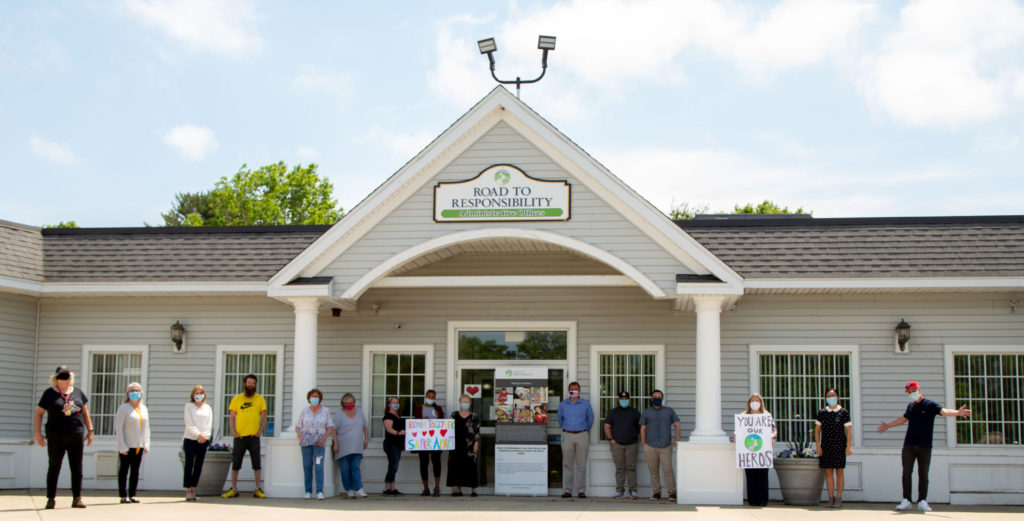Making lives better for adults with intellectual and developmental disabilities is taken very seriously by those who make Road to Responsibility the incredible organization it is today.
Road To Responsibility, Inc. is one of the premier human services organizations in Massachusetts. Founded in 1988, the organization provides a full array of residential, employment, community-based day, and day habilitation services for adults with intellectual and developmental disabilities (I/DD)including people with autism spectrum disorder and acquired brain injuries.
“This means we strive to serve everyone who is referred to us regardless of their clinical, behavioral or medical needs because we believe that all persons with I/DD deserve the opportunity to take their rightful place in the community as fully engaged citizens,” said President and CEO Chris White. As such, RTR tends to serve more Individuals with significant emotional, behavioral and medical challenges than most other human services providers. “We are very proud of the integrated clinical team approach we have developed which has enabled us to successfully meet their needs.”
White was actually RTR’s first executive director from 1989 to 1992 and he has had a long history with the organization. After completing his doctorate in psychology in 1992 and, later, his post-doctoral clinical rotation to become a licensed psychologist, White remained involved with RTR continuously by providing clinical consultation, doing training for staff and treating a number of people who have been served by the organization over the years. He has been the president and CEO since 2008.
“I had invested a lot of hard work into developing the early RTR and I was determined to help lead it back to success when learning it had fallen on hard times,” he said. “In addition, many of the colleagues from my first ‘tour’ with RTR were still there, including our current COO, Suzanne Powers, Ph. D., among others. While the organization was struggling financially I knew the core services were still strong.”
A number of the programs currently operated by RTR, and for the past 32 years, were originally part of the St. Coletta’s of Massachusetts corporation (part of the Cardinal Cushing Centers). When the savings and loan recession hit the nation, the economy tanked and state funding for adult services became tenuous as state revenues plunged. Ultimately, the St. Coletta’s board of directors decided it would be best for the organization to give up its adult services contracts in order to focus on their core school-based services.
“Once this occurred, I convinced the state leadership at the Department of Mental Retardation (now the Department of Developmental Services) to keep the St. Coletta’s Adult Service programs together,” said White. “They agreed with the proviso that I remain in the primary leadership role and Sue Powers stayed on as the head of our residential division. We agreed to this condition, and Sue Powers and I immediately attempted to form our own nonprofit organization to take over those contracts.”
Time was against White and Powers, however, and it quickly became clear they couldn’t meet all the requirements to make that possible.
“In the meantime, Rick Walker and his wife, Cass, had started Road to Responsibility to help meet the social needs of adults with I/DD a few months before St. Coletta’s decided to drop the adult services programs,” White said. “Given our familiarity with Rick, I reached out to him to see if there’d be interest in RTR taking over the former St. Coletta’s contracts, along with the state’s proviso regarding the involvement of Sue and I. Obviously, he said yes, so RTR went from a tiny start-up to a multi-million dollar organization overnight.”
Programs, Services
All of the services at RTR are geared towards adults with intellectual and developmental disabilities, including Autism Spectrum Disorders (ASD) and Acquired Brain Injuries (ABI). Typically, adult services begin at age 22 (when most people leave the special education service system), though RTR has had several instances over the years where they’ve taken in people as young as 18 because their needs exceeded what their school system could reasonably provide.
“We have specialty programs established for people with significant behavioral health, medical, ASD, ABI and dementia/Alzheimer’s conditions,” White said. “Our OPTS [Opportunities for Positive Transitional Services] offers community-based day services. Those services are designed to help people transition from needing site-based staff support during the day to either individual or group employment positions in typical work settings. We have people working in a wide array of jobs and settings throughout the South Shore and Southeastern Massachusetts. Many of the people RTR serves had previously failed with other providers before finding success with us!”
Supporting The Team
The Road to Responsibility team consists of more than 800 employees with an enormous range of skills, talents, experiences, interests, intellects and “emotional intelligence,” White said. Eighty percent of the employees are women, 47 percent are people of color and many are legal immigrants who came to RTR from 29 different countries.
In terms of senior management, RTR has an “outstanding” group of people who have attained high levels of academic training, licenses, certifications and experience in their respective specialty areas. A complex nonprofit organization like RTR includes diverse specialties such as clinical (psychiatry, psychology, ABA and nursing), IT/Cloud computing and AI applications, building trades (carpentry, plumbing, electrical, maintenance), finance, human resources, quality assurance and training.
 “I appreciate the fact that most of our senior leadership team has been with the organization for decades and virtually everyone has spent time involved providing direct care to people with I/DD in their backgrounds,” said White. “This makes a huge difference, because we know the challenges and stresses our Direct Support Professionals face on a daily basis and we keep that perspective in focus with every major decision we make as a group.”
“I appreciate the fact that most of our senior leadership team has been with the organization for decades and virtually everyone has spent time involved providing direct care to people with I/DD in their backgrounds,” said White. “This makes a huge difference, because we know the challenges and stresses our Direct Support Professionals face on a daily basis and we keep that perspective in focus with every major decision we make as a group.”
Road to Responsibility stands out from similar organizations because of its unwavering commitment to serving even the most challenging and complex people, according to White.
“This means that we always stand ready to learn more, seek expert consultation when needed and to invest in the supports necessary to help a given member of the RTR community to be safe, successful and happy in the community,” he said. “We also stand out because of our commitment to truly developing our personnel and helping them to grow professionally (hopefully with us!). In 2012, we negotiated an agreement with the Van Loan Graduate School at Endicott College to become a satellite campus for their master’s degree program in Applied Behavior Analysis and we pay 80 percent of all costs of the program for up to 10 employees at a time for those who already have their bachelor’s degrees, experience with the agency, and a desire to pursue a more clinically-tracked career.”
In 2015, RTR was able to negotiate a special arrangement with Southern New Hampshire University, allowing all of its employees and their families to obtain extremely affordable, high-quality college degrees through its College for America program. As with the Endicott program, RTR also pays for up to 10 employees at a time to pursue their bachelor’s degree through this program.
“We do everything in our power to enable both the people we serve and those we employ to grow personally and professionally… that’s a major differentiating factor setting RTR apart from the pack,” said White.
Challenges Of The Pandemic
As with many other organizations, the COVID-19 pandemic has had a tremendous impact on the entire organization. All of its day programs have been shut down since March 16, 2020.
“I am so proud to work with real heroes who came to work every day during the surge and were willing to separate from their families for weeks at a time to quarantine in place with our residents because they knew they were needed. In my opinion, we have the finest staff of employees in the state,” said White. “We have become experts in PPE and have spent exorbitant sums of money on extra pay for our employees who placed themselves at personal risk during the pandemic, along with PPE, cleaners, sanitizers and commercial disinfecting services over the past five months.”
Thankfully, he added, the Baker Administration and the leadership in the Executive Office of Health and Human Services and the Department of Developmental Services understood the gravity of the situation and quickly, effectively initiated an emergency funding strategy that helped the provider community meet this unprecedented crisis which threatened the viability of the entire human services system.
“We continue to deal with the effects of the pandemic. Like most businesses and the state itself, our budget is filled with question marks while we struggle to safely reopen our day services while meeting our financial obligations to the many landlords and vendors with whom we contract,” said White.
The pandemic has also pushed the organization to innovate and pull together in ways it’s never had to before. RTR has developed a suite of remote/virtual services for its day services’ members that have enabled many of them to access needed support while providing them with an opportunity to connect with friends and relieve the isolation so many have struggled with over recent months.
Unfortunately, however, many of the people RTR serves simply cannot either access or experience significant benefits from remote services due to their personal disabilities. For example, many people find it difficult to sustain attention to video screens or struggle to process information conveyed through remote means since they miss important nonverbal cues that can’t be fully captured over FaceTime or Zoom calls.
“Other impacts concern our actual ability to reopen our day programs,” said White. “Many members and their families have risk factors which make a return to group services too risky, not to mention that social distancing rules mandate 113 square feet of space for each person greatly reduces the number of people we’re able to serve in a given site. Similarly, many of our employees have either lost childcare resources or have personal risk factors making it impossible for them to return to work, further diminishing our capacity to resume normal operations. This confluence of factors is placing tremendous strain on our ability to maintain these vital day services for adults with I/DD.”
Fundraising
Funding is also an ongoing challenge for RTR.
“We try to address this issue through our ongoing development/fundraising efforts,” White said. “This year, our 32nd annual ‘Making Lives Better Gala’ is being held virtually on Sept. 24, since the pandemic precludes normal festivities. This is an exciting challenge for the organization, though, and we think it will be a fun evening.
“Participants will still have a chance to learn more about the impact RTR has in the lives of those we serve and, of course, will have the opportunity to make donations to help keep our mission moving forward in these challenging times. Overall, when we are faced with challenges we have become good at innovating and being creative so that the needs and best interests of our members are being met.”
Road to Responsibility serves people from more than 100 different cities and towns in Massachusetts. Its programs operate from Milton through the South Shore to the Cape Cod Canal, as well as the Taunton/Attleboro area and up to Randolph.
“We have a tremendous team of professionals here, at every level of the organization, who are incredibly skilled and committed and who show up every day to help others, even when it is really difficult; even when it is risky. I am so proud to call such great professionals my colleagues,” said White.
“We help people by developing an individualized, person-centered and person-directed (to their fullest capacity) plan to meet their personal life goals (depending on which services the member is receiving from us),” said White. “We then build in whatever clinical services are necessary to facilitate their progress. More than anything, though, it is the strength and depth of relationships developed among the RTR employees and the members they support that drives and promotes the positive progress we see every day!”
For more information about Road to Responsibility call 508-746-2759 or visit www.roadtoresponsibility.org


























